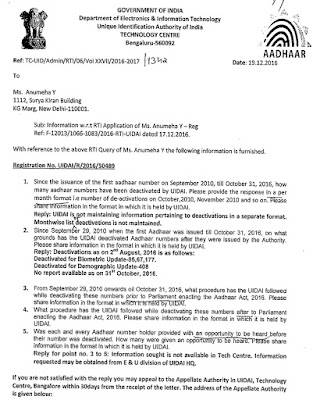Amidst Government of India seeking to make aadhaar mandatory for filing income tax returns, Right to Information (RTI) queries have revealed that the Unique Identification Authority of India (UIAI) has deactivated a whopping 85,67,177 aadhaar cards for “biometric update”, and yet another 408 for “demographic update” between September 2010 and August 2016.

Interesting though it may seem, one of the RTI replies, given to a plea made by senior journalist Anumeha Yadav of left-of-centre site, scroll.in, says that aadhaar numbers requiring deactivation are “identified by enrolment processing systems” and the deactivation is done “without human intervention”.
Yet another reply says that the UIAI does not maintain “data on deactivations according to the enrolment agency or the registrar that carried out the enrolment, or the authorised official who carried out the deactivation”. In all, Yadav received five separate replies to her queries, which she had made last year.
Bringing this to light, Yadav write, “The Authority’s Data Update Policy states that the fingerprints and iris scans of infants and children enrolled in Aadhaar must be updated within two years of their attaining the age of five, and then again at the age of 15.”
“If they fail to do so within this stipulated two-year period, their aadhaar numbers will be automatically deactivated”, Yadav says, adding, as for the demographic updates – which are surprisingly extremely few (just about 408 in seven years) – these “pertain to changes such as death, change of address, or to correct errors in demographic data during enrolment.”
 |
| One of the RTI replies |
Though Yadav is also told that “those whose numbers are deactivated are informed via text message on their mobile phones”, she is also informed that individuals are “not communicated the deactivation in printed mode or by post.
Yadav quotes Vikash Shukla, senior manager, communications and public outreach, UIAI, as saying, “Most deactivations occur as children are required to update their biometrics when they turn five or 15 years old, and if their data is not updated, their Aadhaar numbers get deactivated.”
As for the grievances redressal system, the UIAI says in RTI reply, it does not have information on officials, within it or outside, who are authorised to carry out deactivation on receiving complaints, nor does it share information on the policy and procedure followed with respect to officials responsible for grievance redressal.
Pointing out that UIAI does receive complaints both through a portal of the Department of Administrative Reforms and Public Grievances, an online platform used by various ministries, and through post, one of the RTI replies shares year-wise and state-wise grievances received between 2010 and 2016 on the “PG portal”, but adds it does not maintain “any record for offline grievances submitted on paper.”
The reply further states that grievance redressal through the 1947 call centre services have been “outsourced” to Tata Business Service Solutions and M/S SMPL. “These firms have their own policies to recruit customer care executives [voice and non-voice], and it is their internal matter. These are contractual partners of UIDAl and UIDAI has no role in recruitments of staffing in these firms.”
According to Yadav, the replies are significant, as these also come following government notification that aadhaar, or at least proof of enrolment in Aadhaar, was mandatory for several vulnerable groups – including women rescued from trafficking, workers engaged in forced labour, schoolchildren between six and 14 years of age, and people with disabilities – to continue to receive government benefits.
In the case of the schoolchildren, for instance, they will not be served mid-day meals from June if they cannot present their Aadhaar credentials.
Courtesy: Counter View
